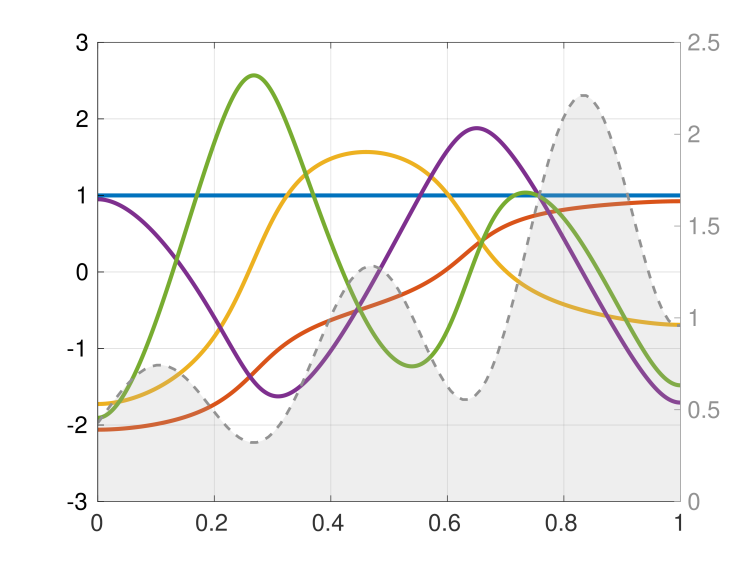Poincaré chaos expansions for derivative-enhanced surrogate modelling and sensitivity analysis
Principal investigators: N. Lüthen
Collaborators: external page O. Roustant, external page B. Iooss, external page F. Gamboa (external page Institut de Mathématique, Toulouse, France)
Description

Variance-based global sensitivity analysis, and in particular Sobol' analysis, is widely adopted to determine the importance of input variables to a computational model. Sobol' indices can be computed cheaply based on spectral methods like polynomial chaos expansions (PCE). Another option is given by the recently developed Poincaré chaos expansions (PoinCE), whose orthonormal tensor-product basis is generated from the eigenfunctions of one-dimensional Poincaré differential operators.
The Poincaré differential operator is a special case of Sturm-Liouville operator and has recently been revisited for sensitivity analysis (external page Roustant et al., 2017). Solving the associated eigenproblem yields the Poincaré constant for a large class of one-dimensional measures with bounded support. The associated eigenfunctions form an orthonormal basis with the special (and characterizing) property that derivatives of the basis form again an orthogonal basis with respect to the same measure (external page Lüthen et al., 2022). The expansion of a model in terms of this basis allows the analytical computation of Sobol’ indices and derivative-based sensitivity indices (DGSM) directly from the expansion coefficients.
Furthermore, the special property of the derivatives makes PoinCE particularly well suited to account for derivative information in the computation of sensitivity indices (external page Roustant et al., 2020). Indeed the expansions involving either model or derivative evaluations are connected, and computations can be reused. Assuming that partial derivative evaluations of the computational model are available, we compute spectral expansions in terms of Poincaré basis functions or basis partial derivatives, respectively, by sparse regression. We show on numerical examples that the derivative-based expansions provide accurate estimates for Sobol' indices, even outperforming PCE in terms of bias and variance, and explore the performance of PoinCE as a surrogate model.
Our results are available as preprint (external page Lüthen et al., 2022).
References
Roustant, O., Barthe, F., & Iooss, B. (2017). external page Poincaré inequalities on intervals–application to sensitivity analysis. Electronic Journal of Statistics, 11(2), 3081-3119.
Roustant, O., Gamboa, F., & Iooss, B. (2020). external page Parseval inequalities and lower bounds for variance-based sensitivity indices. Electronic Journal of Statistics, 14(1), 386-412.
Lüthen, N., Roustant, O., Gamboa, F., Iooss, B., Marelli, S., & Sudret, B. (2021). external page Global sensitivity analysis using derivative-based sparse Poincaré chaos expansions. arXiv preprint arXiv:2107.00394.
